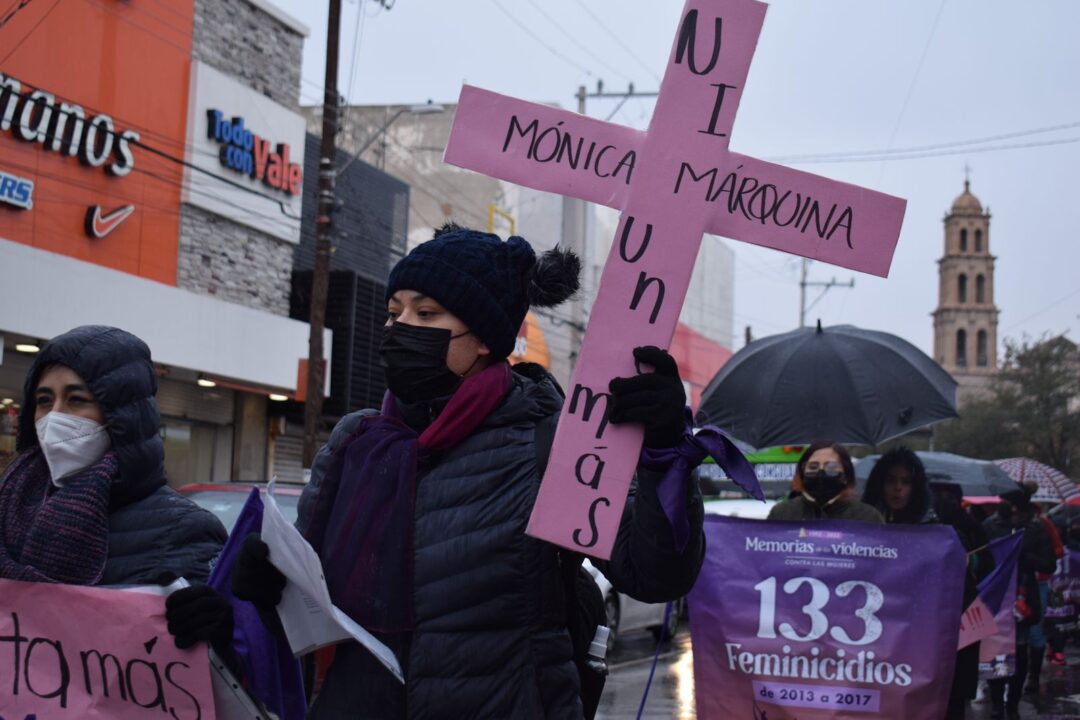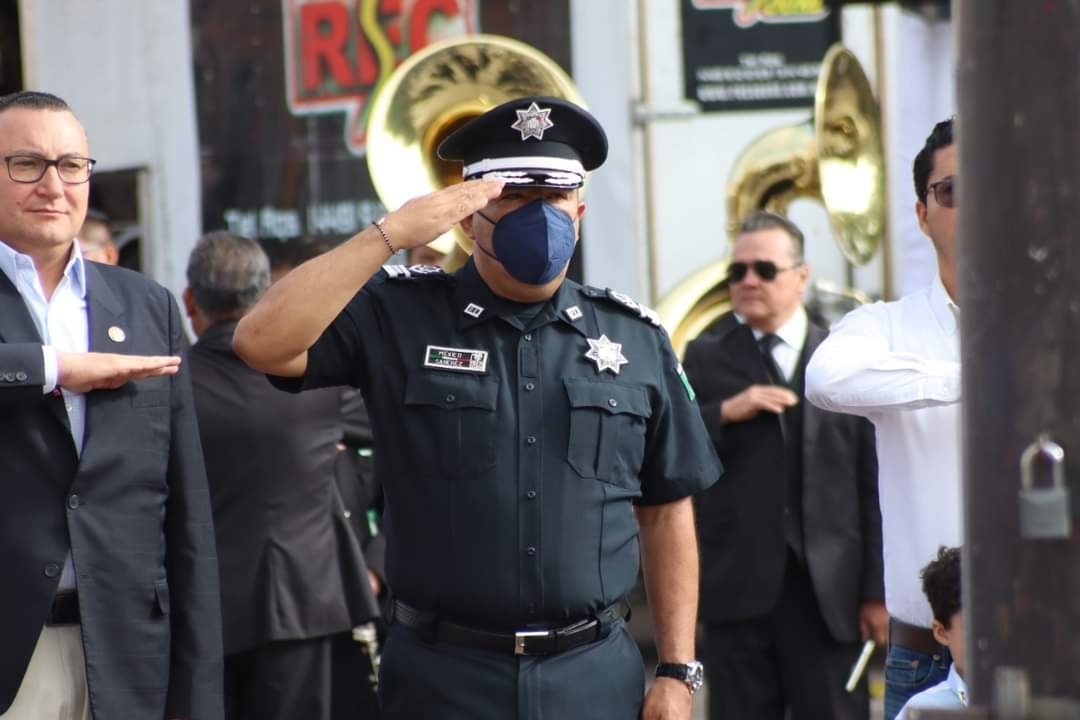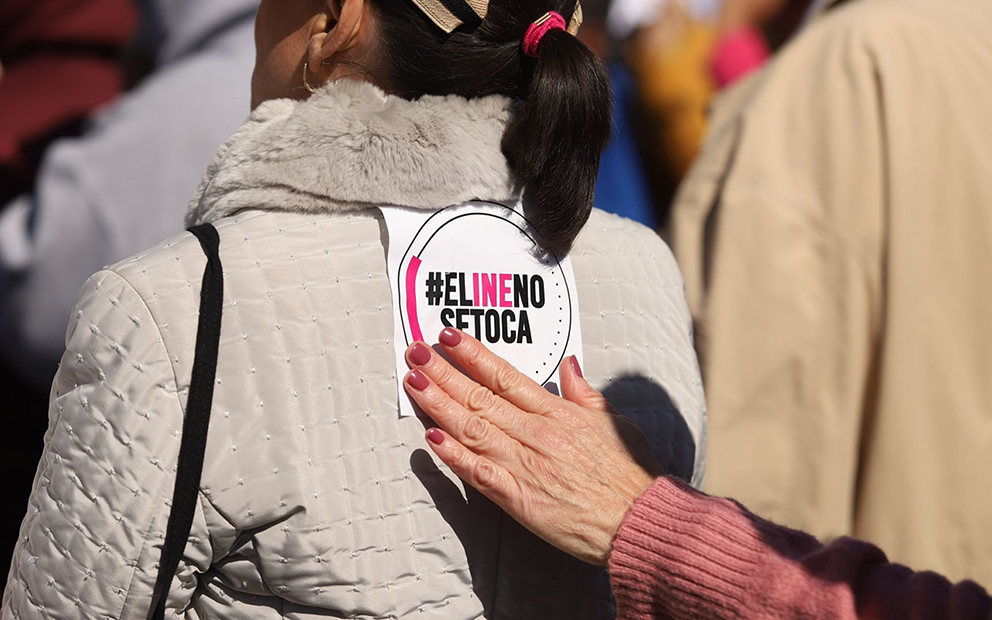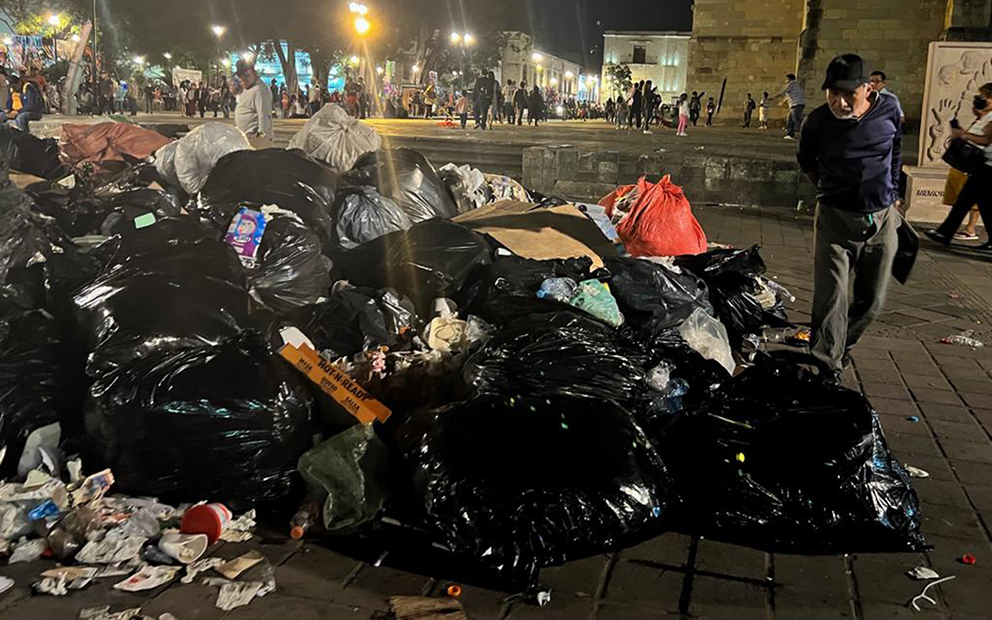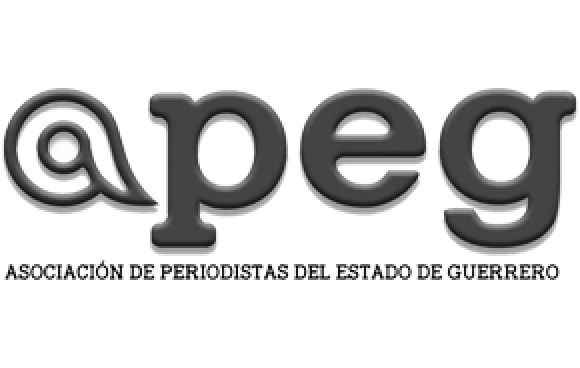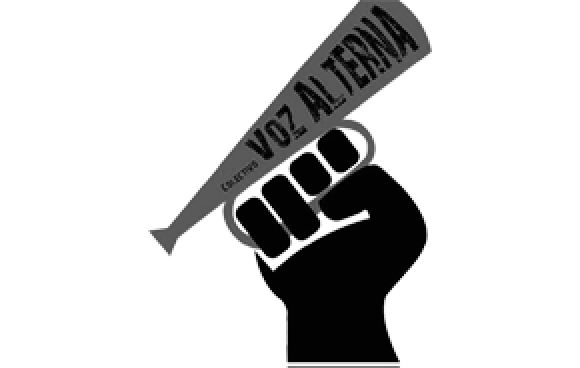Nearly four years after the femicide of María del Sol in Oaxaca, impunity reigns
29 abril, 2022
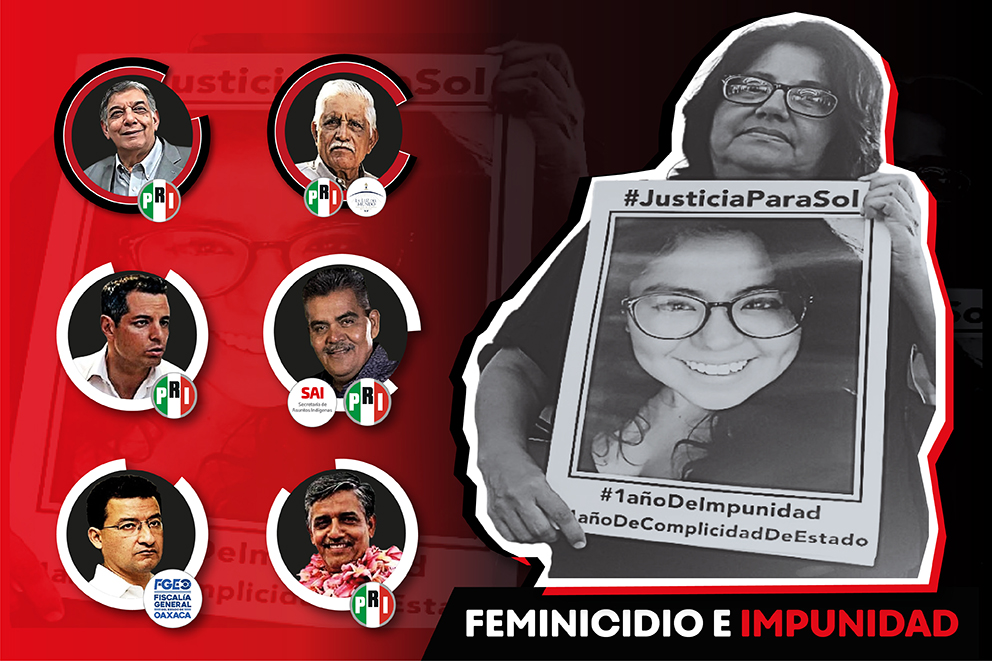
Photojournalist María del Sol was killed in 2018 in Juchitán, when she was covering the political campaign of Hageo Montero, brother of Francisco Javier Montero, the ex-secretary of Indigenous Issues in Oaxaca. In order to understand her killing, it is important to consider the relationships between current governor Alejandro Murat and the Montero family, whose connections and power go back to the 1970s, and involve the PRI, wind energy and political control of the Isthmus of Tehuantepec.
Text by Karen Rojas Kauffmann, originally published on April 22, 2022 by ElMuro.mx.
Research and graphics by Antonio Mundaca.
OAXACA CITY—It was 2:27 in the morning on Friday, June 2nd 2018 when Pamela Terán Pineda and María del Sol Cruz Jarquín’s destinies crossed forever. Pamela, who was 29, was the municipal official in charge of energy, who was taking leave to campaign for Juchitan’s city council for the PRI-PVEM (Institutional Revolutionary Party-Mexican Green Party) alliance in the region of the Tehuantepec Isthmus. María del Sol, a photographer and videographer who was just 27, was the head of the Department of Holistic Indigenous Intercultural Communication of the Secretariat of Indigenous Issues (SAI), which is now called the Secretariat of Indigenous and Afro Mexican Peoples (SEPIA).
María del Sol had been sent against her will, and threatened with losing her job if she didn’t, to one of the most dangerous regions of Oaxaca to “support” the electoral campaign of Hageo Montero López, a mayoral candidate in Juchitán who’s brother, Francisco Javier Montero López, was the head of SEPIA and María del Sol’s boss. That night, they were stormed by an armed commando that killed Pamela, María del Sol and Adelfo Jiménez Guerra, Pamela’s driver, who was waiting for them in a gray truck.
“That would change anyone’s life. The same people who took my daughter’s life, have taken the lives of others, I’m sure of it and I say this with great pain,” said journalist Soledad Jarquín Edgar, who is María del Sol’s mother. “The number of women killed during governor Alejandro Murat’s term is going to be way higher than during the last four governors of the state of Oaxaca.”
Crumbs from Murat to keep Oaxacan women quiet
Me platica que en marzo de 2021, el mandatario oaxaqueño anunció el programa Por ellas, acciones para familias víctimas de feminicidio, con el cual prometió atender a las víctimas indirectas de este delito. “Pero creo que él piensa que dándonos migajas nos va a tener calladas. Nosotras lo que queremos es justicia, porque sólo dándonos justicia nos vamos a acercar a la reparación del daño”, señala Soledad, convencida.
Jarquín Edgar told me that in March of 2021, Murat announced the program “For them: actions for families who are victims of femicide,” which he promised would attend to the indirect victims of femicides (their families) in the state. “But I think he thinks that by giving us crumbs he’s going to shut us up,” said Soledad. “What we want is justice, only by getting justice can we begin to heal.”
The journalist, who in 2006 won México’s National Journalism Prize, has been fighting for nearly four years to get the justice denied to her by authorities. In 2018, the killing of her daughter María del Sol was investigated as a qualified homicide, even though lawyers, organizations and feminist groups demanded it be investigated as a feminicide.
Turning a blind eye to femicide
“Maria del Sol was killed by 10 bullet wounds, her body was very damaged. Her internal organs, her arms and her legs were destroyed, the attack was extremely violent and her wounds caused instant brain death,” said Jarquín. Even so, then Oaxaca Attorney General Ruben Vasconcelos Méndez used a series of legalistic maneuvers to avoid recognizing the deaths of Pamela and María del Sol as femicides.
When Arturo Peimbert Calvo became Oaxaca’s new Attorney General in March of 2021, Soledad managed to get her daughter’s killing reclassified as a femicide. But Peimbert Calvo, a lawyer and former human rights defender, sought a stay of legal hearings. Because of that, in November of 2021, José Eduardo ‘N,’ one of two men implicated in the triple homicide, walked free.
His release was linked to weaknesses in the evidence presented by the AG’s office, and followed the release of Jehú N, the first suspect detained for the crime, who was let go six days after he was detained on August 28, 2018 due to inconsistencies. Both were employed by Hageo López, and Jehú was his nephew.
Political operatives, evidence thieves
The morning of the massacre, a worker for the state government tried to eliminate all proof that María del Sol was working on the campaign against her will. He removed all of her personal items from the hotel where she was staying.
“When my daughters went to retrieve the belongings of their murdered sister, they were notified by employees of the hotel that a man with an SAI identification had taken María del Sol’s work equipment,” said Soledad. After a long pause, she continued. “The man who took her things came back with her equipment, including a camera, a video camera, and a Mac Pro, and said ‘I’m in trouble already, here’s her things.’ But we already knew who he was because the hotel employees had taken a photo of his badge,” she said.
After the robbery of her daughter’s work equipment, journalist Soledad Jarquín Edgar informed Vasconcelos Méndez and made a complaint for attempted robbery. Based on that complaint, the Secretariat of Governmental Auditing and Transparency (SCTG) carried out an investigation inside the SAI to determine who was responsible, and found 10 people presumed to be linked to acts of corruption.
Among the public servants who were involved was the SAI employee who had removed María del Sol’s items from the hotel in the morning of June 2nd. That’s how Soledad learned the employee was actually a public servant who was at the managerial level within the Secretariat. “He was working in total impunity and no authority was overseeing him until December 31, 2018, when the head of the SAI was changed.”
AGs protecting their friends
On Tuesday June 5th, 2018, Esther Araceli Pinelo López, who is head of the Special Investigations Unit for Electoral Crimes (FEPADE), announced in a press release that they would open an investigation of those within the SAI who were related to potential acts of political campaigning. Regardless, half a year after the massacre, the FEPADE still hadn’t pressed charges, even though Oaxaca’s AG had informed that there was an investigation for electoral crimes open.
Jarquín Edgar took advantage of the change at the top of the Attorney General’s office and, given the FEPADE’s slowness, asked for the case files. That’s how she learned that Pinelo López didn’t start investigating in June of 2018 as he had stated publicly, but rather in July of 2019.
“She very intelligently removed the case file for the robbery complaint and opened another in July of 2019, which explains why the 10 government workers involved in corruption were never touched,” said Soledad. “They had them in their sights, if they wanted to detain them they could have, but they didn’t. They could have detained the person who took María del Sol’s belongings.”
The journalist launched a complaint through the State Electoral and Citizen Participation Institute of Oaxaca (IEEPCO). That file was handed over to the State Electoral Tribunal (TEEO), after which Hageo Montero López was fined $25,000 (US$1,250) for committing an electoral crime.
María del Sol’s mother protested and the fine rose to $45,000 (US$2,250). Soledad protested again and the High Court of the Electoral Tribunal of the National Judicial Branch determined he had committed a serious electoral violation, and fined him $90,600 (US$4,530). In addition, the same tribunal asked governor Murat Hinojosa to discipline his subordinate, Francisco Montero López.
That fine was in effect canceled when then Finance Secretary Vicente Mendoza Téllez Girón, granted Hageo Montero López a series of ‘stimuli’ checks for $3,900 (US$195) to pay the fine (which should have been paid in a single payment within 180 days), arguing that Montero López didn’t have the resources to pay $90,600 (US$4,530).
“It was a sorry excuse, and not very believable because at that time Hageo was the Representative for Renewable Energy for the Municipality of Juchitán de Zaragoza,” said Soledad, fuming. “The governor of Oaxaca didn’t punish Francisco Montero Lopez either, it claims to be waiting for the Administrative Justice Court to rule, but that process is on hold, which they justify because of the pandemic,” she said.
On November 24, 2020, and given the obvious protection of the Montero brothers, Soledad Jarquín Edgar attended President Andrés Manuel López Obrador’s morning press conference in Mexico City. She denounced the feminicide of her daughter, that continued in impunity, and she handed the president a letter signed by more than 18,000 people demanding an end to the killings of women in Mexico. That night, Interior Minister Olga Sánchez Cordero received the Oaxacan journalist just as the president directed, so as to follow up on the case. Even so, a year and a half later, none of those involved have been punished.
The ex-AG who stole justice
Soledad Jarquín has done many things in her quest for justice. She’s convened marches and demonstrations, and made public complaints against former AG Vasconcelos Méndez so that he will face trial for his silence, negligence and complicity. She even protested in Oaxaca’s congress. “The man sitting there is corrupt, he stole justice for my daughter,” she declared on January 25, 2022, during Ruben Vasconcelos’ first annual report as the head of the state Secretariat of Wellbeing. It was Alejandro Murat who awarded him with that cushy position.
“Rubén committed omission, falsification, and corruption in my daughter’s case, as he’s done in the cases of dozens of women, and he’s been the key operator of the Montero López brothers,” said Jarquín Edgar, as Oaxacan legislators sat in complicit silence.
During the four years they’ve been fighting for justice, the Cruz Jarquín family has been continually threatened and attacked. There are six case files open right now, explains Soledad, who is dressed all in black. “One for homicide, another for electoral crimes committed by the Montero brothers, another for the theft of Sol’s equipment, where she kept a record of the work she was forced to do, there’s one in the Administrative Justice Court for corruption, another against the Monteros for the improper use of public resources, and finally, one against Rubén Vasconcelos for obstruction of justice, which was opened in 2020. But today, all of those files are dead.
Those responsible escape
Lourdes López Velasco, Soledad’s lawyer, revealed that the case file was rife with irregularities: signatures were faked, copies of videos of the events were missing, the report by the ballistics expert didn’t match with the triple murder, one of the witnesses was invented, there was no records from Pamela Terán’s phone, and other proof from the phones was “confused.”
“This hurt a lot because it was proof of what we’d been saying since the outset: they don’t investigate, and not investigating means they just make things up. It wasn’t homicide, it was femicide. And when we looked over the file we saw so many things that the Attorney General didn’t investigate. And the case went to pieces,” said the journalist.
“It’s clear to me that they were after Pamela Terán, and that the case of my daughter is a feminicide that happened because she was present when that killing took place. The issue is that we have nothing. We don’t know who pulled the trigger, or who planned it.” Soledad pauses, and glances into the distance.
Pamela and wind energy
Pamela Itzamaray Terán Pineda wanted to be mayor of Juchitán. She was an independent candidate for the position in 2016. After losing, she became a city councilor, and later she became the municipality’s Representative for Renewable Energy, which meant she was dealing directly with issues related to wind farms. Officially, she was given the job because of her increasing popularity, as well as the political control she wielded through her organization “Wake up Juchitán.”
But according to various sources consulted for this story, the real motive for putting Terán Pineda in that strategic position was that she was the daughter of Juan Terán Regalado, known as the “Chapo of the Isthmus.” Various local media have reported that he is the leader of the Juchitán Cartel. Since April 19, 2017, he’s been in prison for crimes against health, carrying firearms and organized crime.
In 2018, Pamela became a member of Hageo Montero López’s election slate with the PRI. Montero López is the son of Porfirio Montero Fuentes, president of the Union of Renewable Energy Owners of the Isthmus (UPERI), which groups together farmers who rent their land to different wind energy companies.
In addition, Montero Fuentes is an evangelical leader who has exercised political control in the region since the 1970s related to his links to ex-governor José Murat Casab. Their friendship has led them to share not only a childhood in La Ventosa and Ixtepec, but later, activism in the PRI.
José Murat was a federal congressperson for the PRI between 1988 and 1998, and he passed his seat in Oaxaca’s since disappeared District 01 to Porfirio Montero between 1991 and 1994. Montero was also José Murat’s political operative when he was seeking a senate seat in the 1990s.
When Murat came to power he pushed the career of Porfirio Montero’s son Francisco Javier Montero forward, naming him as a councilor in the Municipal Development Institute and the head of the Industrial and Commercial Development Secretariat from 2000 to 2002. He was also the coordinator of “Oaxaca Youth” during Murat’s 1998 gubernatorial campaign.
Twenty years later, Alejandro Murat Hinojosa emulated his father. He put Porfirio Montero’s son in charge of the Secretary of State, named him to the head of Indigenous Issues and approved Hageo Montero’s candidacy for the PRI in Juchitán.
In 2018, Hageo Montero López lost the elections to Emilio Montero Pérez, Morena’s candidate to become mayor of Juchitán. Interestingly, Hageo Montero was named Representative for Renewable Energy, the same post created for Pamela Terán by the previous government, and which is central for his father Porfirio Montero’s interests as leader of the UPERI.
Death threats for demanding justice
Two years ago, the feminist organization Consorcio Oaxaca denounced death threats against Soledad Jarquín. On June 15, 2020, a black bag with pieces of animal meat and a card supposedly sent by the Jalisco New General Cartel were found in front of her house. Soledad has also stated that unknown people have been seen taking photos of the homes of her family members on a systematic basis.
The NGO has said the threats could be related to her work with the “Until we get justice” campaign,” through which she has been demonstrating the impunity and complicity of different levels of government with regards to her daughter’s case.
On June 7, 2021, Mary Lawlor, the United Nations Special Rapporteur, urged Mexican authorities to guarantee the security of Soledad Jarquín Edgar, in the context of the third anniversary of the femicide of her daughter María del Sol Cruz Jarquín.
This report was originally published by Chiapas Paralelo, which is part of the Media Alliance organized by Red de Periodistas de a Pie. You can read the original here.
Click here to sign up for Pie de Página’s bi-weekly English newsletter.
Ayúdanos a sostener un periodismo ético y responsable, que sirva para construir mejores sociedades. Patrocina una historia y forma parte de nuestra comunidad.
Dona

